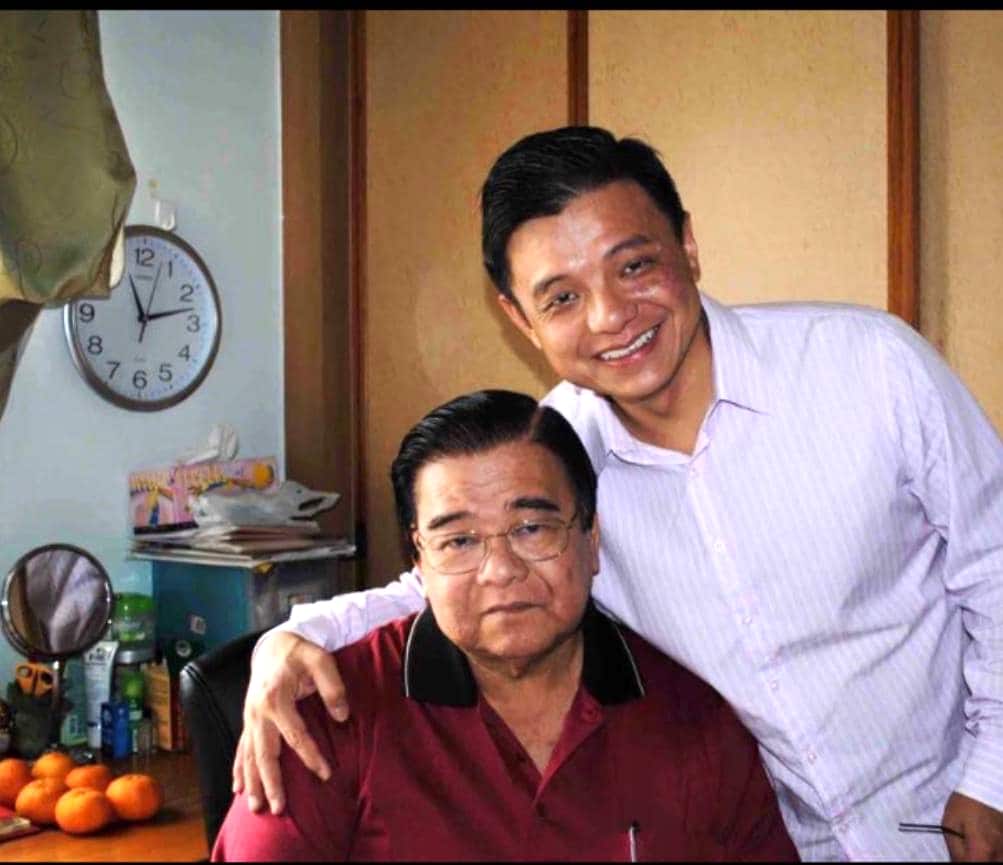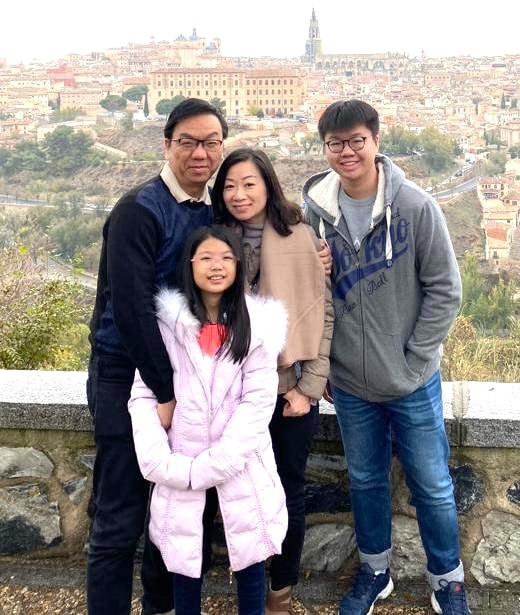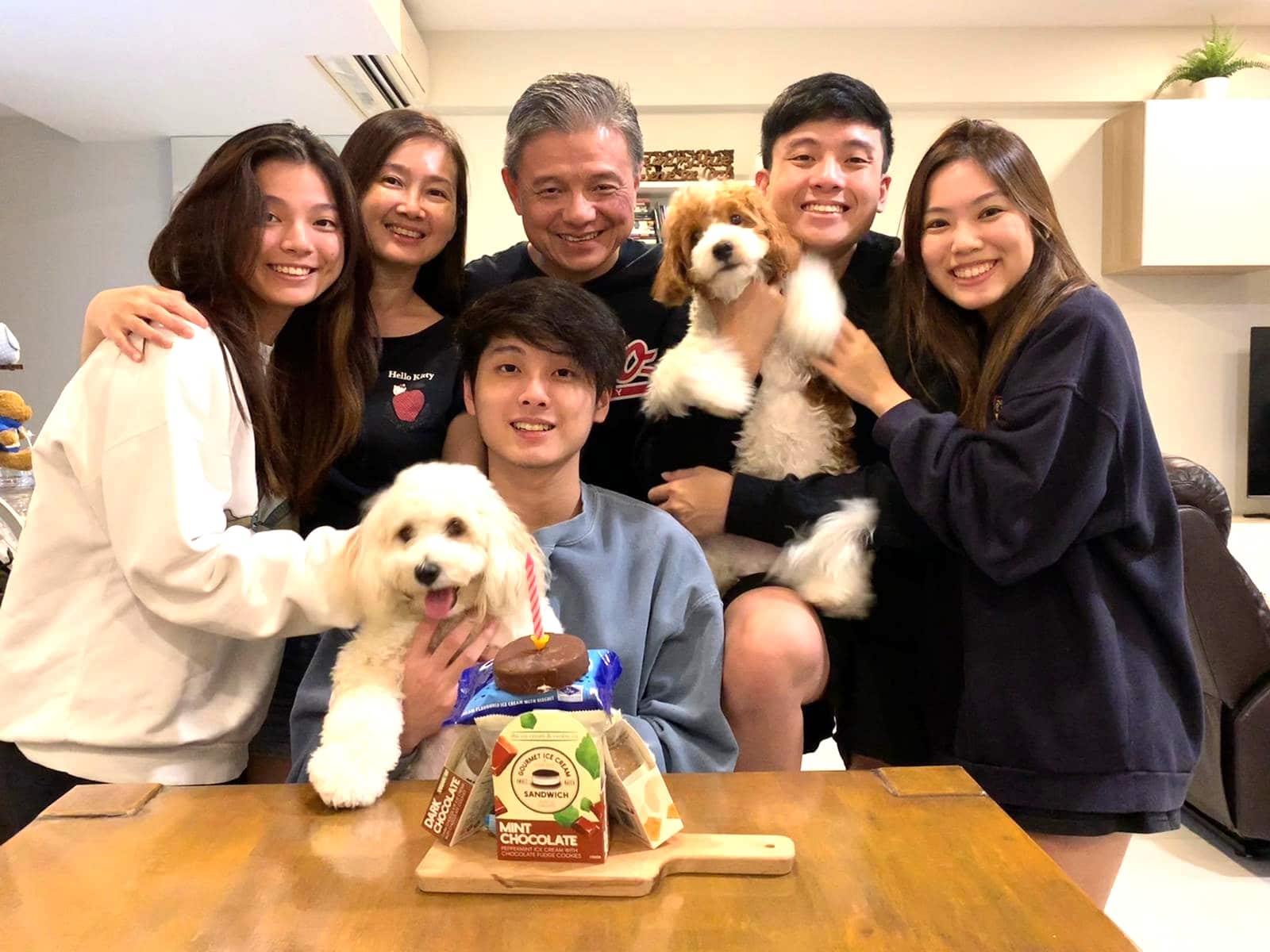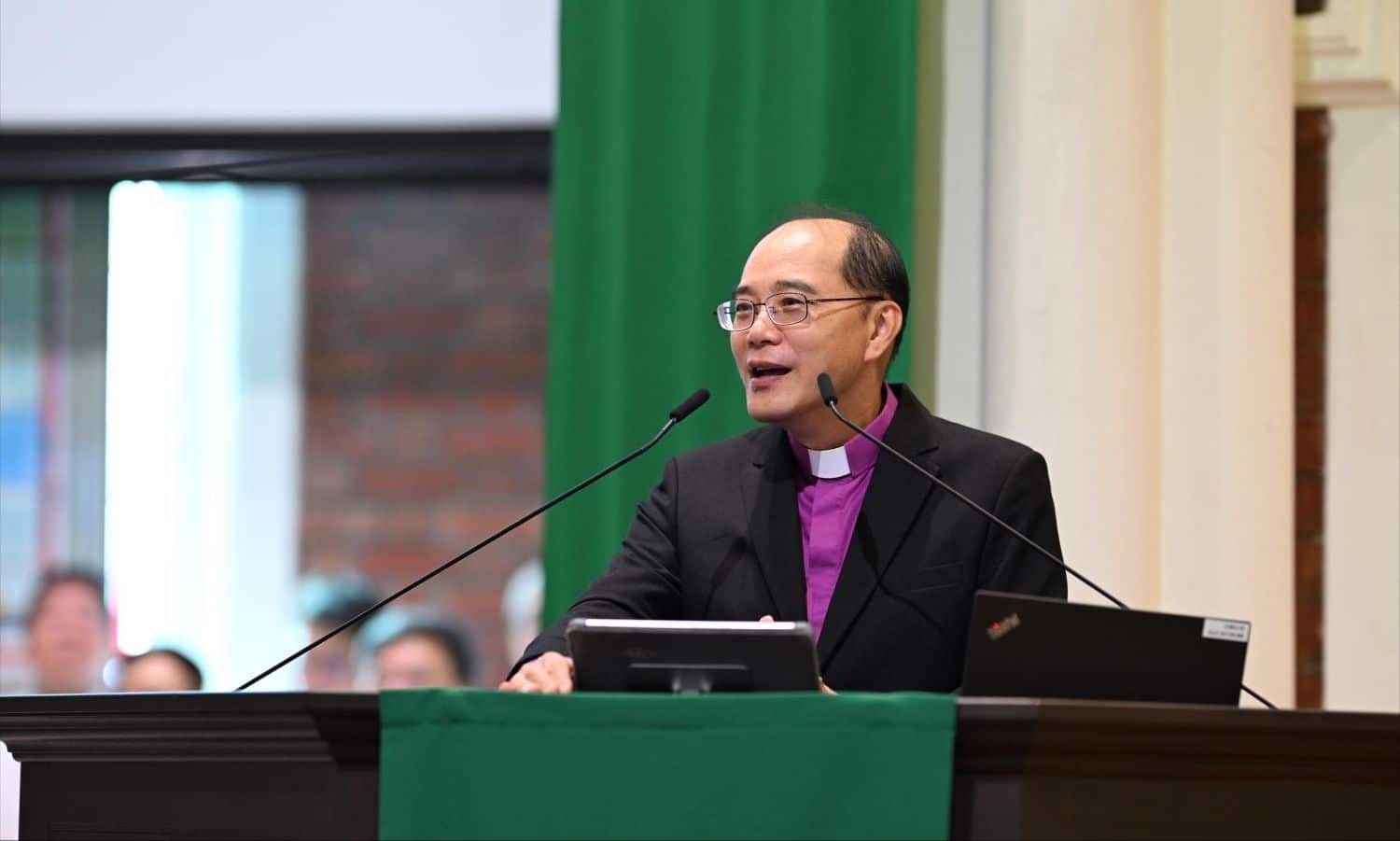I learnt how to be a dad from my father, my spiritual fathers and my heavenly Father
by Christine Leow // March 21, 2022, 4:33 pm

David Ang with his father from whom he learnt the value of hard work and the importance of providing for his family. Photo courtesy of David Ang.
Growing up the only and oldest son in a traditional household, Stevenson Tan enjoyed some perks. He was his paternal grandfather’s favourite and everyone knew it.
“My mum and my uncle would tell me that my grandfather loved me a lot.”
But Stevenson, 55, also carried the burden of being the first-born male in his family.
“As the eldest, if any of my two younger sisters made a mistake, I would get punished because I was the older brother and I had not taught them well.
“I remembered when my sister did something wrong, we had to face the wall together.”
Like father, like son
When Stevenson became a father, how he treated his son, now 19, and his daughter, aged 12, was markedly different, too.
“My father impacted me a lot when it came to how to be a father to my children. I was very strict with my boy.

Stevenson with his wife Esther and their children on a holiday in Spain. Photo courtesy of Stevenson Tan.
“When he was in secondary school, he complained that the way I treated him was different from the way I treated my girl. I didn’t even know it.
“Then, I realised that was how my father treated me. I apologised to my boy. That’s when I realised I needed to do something about it.”
But there were also things his father imparted to him that Stevenson brought into his parenting style – “I appreciate my dad”.
Now a leader in his church and part of Christian fathering movement Elijah 7000, Stevenson is committed to reaching out to other fathers in his church to help them in their fathering journey.
“Why did daddy abandon us again?”
For father of three David Ang, the wakeup call he received on his fathering journey came a decade after he became a dad. At the time, his sons were 10 and six, and his daughter was four.
I didn’t know what it was like to have my father around so the sense of missing him was not so apparent.”
David had been enjoying a highly successful corporate career at the top of senior management. But his job often took him out of the country.
One day he had just come home from an overseas work trip and was preparing to go to church for a meeting when his elder son asked his wife: “Why did Daddy abandon us again?”
Said the 54-year-old: “My world fell apart. I always wanted to be a good father. I know the importance of it. I didn’t know that I was the villain in this whole story of parenting.”
His own father had been a very busy businessman who had inherited the family business. In lieu of spending time with the family, he would take them to the shipyard where he worked.
“Not having him around was the MO (modus operandi). I didn’t know what it was like to have him around so the sense of missing him was not so apparent.”
After that heartbreaking question from his son, David “put a brake on corporate life to spend more time with the family”. He bowed out of an 18-month management course which would have led to a promotion that would require more travelling. Two years after the wake-up call, he opted to leave his company instead of taking an overseas posting.

David (centre) with his wife, Amy, celebrating his younger son’s birthday with his children and his older son’s girlfriend. Photo courtesy of David Ang.
He would spend the whole of 2011 home with his children and his homemaker wife, Amy. His children are now 24, 20 and 18.
David is the chairman of the board of Family Life at the Chinese Annual Conference of The Methodist Church in Singapore which promotes strong families and strong fatherhood. He is also part of The Methodist Fathers Movement, Elijah 7000 and national fathering movement Dads for Life.
Salt&Light spoke with David and Stevenson to find out what lessons they learnt about fathering from their fathers and the father figures in their lives.
Lesson 1: Work hard and provide
Both Stevenson and David attribute their work ethic to their fathers who, coincidentally, both ran businesses.
“My father taught me persistence, excellence and to work hard to provide the best for my children.
“I have a good wife who is very communicative to remind me.”
“When he decided to do something, he keeps his word,” said Stevenson of his father who ran a successful engineering business and is now retired at 74.
David said in agreement: “The need to provide for my family, I learnt from my dad.
“My dad was very committed to the business my granddad passed down to him. He was mostly working seven days a week.”
With the support of his faith community, David tempers the virtues of commitment, focus and diligence that he learnt from his father with efforts to make time for his family.
“I have a good wife who is very communicative to remind me and I have God, and I have a bunch of real good brothers who encourage each other.”
Lesson 2: Time is love
“Love needs to be expressed in a language understood by the person whom the love is shown to,” said David.
Growing up, he knew his father loved him and his six siblings just by watching how hard he worked for them. But they were never told explicitly.
“It was only notional or head knowledge as it was not expressed or actioned in the way which we would know or understand.”
Only when he sold his company and retired did David’s father “take a step back” and try to spend time with the family “to make up for lost time”.
David makes sure his children know they are loved by spending time talking to them.
“We believe children must be raised by their own parents.”
“My children are very close to us and share with us pretty intimate and heart-to-heart matters. To them, we are like their pastors or spiritual guides, and the home like a church.”
Stevenson grew up with a hardworking dad as well. But he always longed to have deep conversations with his father.
“Throughout my life, we have had fewer than 20 heart-to-heart talks. The last one was about two years ago.”
With his own family, Stevenson has worked hard to put them first in terms of time spent.
“My wife and my children are my priority. If they need me, I’ll come home for them. If I’m serving in church, I’ll be excused or get someone to take over my duties.”
After his son was born, it was Stevenson who stayed home to care for him for seven months because his wife had to return to work.
“We believe children must be raised by their own parents. The first two years are very important for mother and father to connect with children.”
That is why, till today, the bond between him and his children remain strong.
“My boy until now still jumps on me and sits on my lap. He’s 90kg. Praise God for that connection.”
Lesson 3: Be fathered by God
After his wakeup call in 2008, David sought to spend even more time with his family and that was when he saw God in two very clear ways.
“I saw His mercy as He helped me restore what I lost in my fathering journey. And I saw His grace.
“When I stepped back in again, I saw Him coming alongside me to teach me the heart of the Father.
“I realised that, to be a father, we need to be fathered by Father God. Otherwise, we would be fathering out of our own orphan spirit or humanistic ways.”
“I learnt to display humility. As parents, we are ready to say sorry.”
As he sought to learn from the “originator of fathering” Himself, David started to see that there was another model to fathering.
“In the past, my model of fathering was to be hero. I’m the hero, I will give you solutions.
“But I learnt that when I am too gung ho, it was quite a turnoff for my kids. And they may not get the chance to develop their own personality and character.”
Encouraged by his wife, David tries not to rush in ready with solutions for his children. Instead, he dialogues with them and offers solutions only when asked.
Learning from God who is “gentle, nurturing and speaks softly to us”, David began to move to a more nurturing way of fathering where there is more “urging in a gentle soft way”.
“I also became a lot freer in sharing my struggles, my problems. That is being very vulnerable.
“I learnt to display humility. As parents, we are ready to say sorry.”
Lesson 4: Don’t be afraid to learn
Said Stevenson: “Before I married, I decided that I want to be a different kind of father from my father but I didn’t have a role model.”
After years of struggling with “my way of doing things”, Stevenson decided to read books on fathering to see how other men did it.
“I speak blessings over them and confirm God’s call for them in their lives.”
“I had so much love for my children but I didn’t know how to love them according to their needs.
“I would take them out, buy them things. But when my son came to me for counsel, I didn’t listen. Instead, I told him what I thought, what I felt.
“Once, he raised his voice and said, ‘You really don’t understand me. You don’t know what I want.’
“God touched my heart and taught me to listen. I apologised to my son.”
These days, instead of just dispensing advice, Stevenson speaks blessings over his children.
“Sometimes, when they go through difficulties, they will have self-blame, ‘I’m no good.’
“Instead, I speak blessings over them and confirm God’s call for them in their lives.”
Lesson 5: Mentors can fill the gap
Stevenson and David also have spiritual fathers in their lives from whom they learn about being fathers.
“From him, I learnt about the gentleness of a man.”
Both men count Jason Wong, the champion of fathering in Singapore, as their spiritual father.
Said Stevenson who meets Jason once a month: “He sowed deep into my heart the father’s love and gave me a lot of affirmation.
“From him, I learnt about the gentleness of a man.”
David also comes under the spiritual tutelage of founder of Family Foundations International (FFI) Craig Hill.
“He comes to Singapore maybe once in three to four years. Each time when he comes, we connect very well.
“I see him as a spiritual father. Things that he prays for me about and talks to me make a lot of sense.”
Salt&Light Family Night: From the father I am to the father I want to be
Fathers are important and the statistics bear it out.
When dads are involved, their children do better, says 82% of studies on father involvement and child well-being that have been published.
In some 100 studies on parent-child relationship, it was found that having a loving and nurturing father was important to the happiness, well-being, and social and academic success of a child.
This coincides with findings from the University of Pennsylvania which states that children who feel a closeness and warmth with their fathers are:
- Twice as likely to enter college;
- 75% less likely to have a child in their teens;
- 80% less likely to be incarcerated;
- Only half as likely to show various signs of depression.
So how can fathers do better and be better? Join our panellists – fathers, a grandfather and a mother – as they share tips about the fathering journey.
Parcsen Loke is a husband, father of three and grandfather of one, with another grandchild on the way. The author of The Modern-Day Dad, he oversees the programmes at the Centre for Fathering and is a relationship coach.
Dr Frankie and Tina Tan are parents of three boys aged 19, 18 and 13. They are passionate in supporting families on various platforms in the community. Frankie has been active with Dads for Life since its inception. He also facilitates a group with men in various life stages and also does individual mentoring. They both do couple and individual coaching with a special focus on ADHD.
Bruce Mathieu grew up without a father and knows first-hand how easily a fatherless boy can be bullied. As a lonely teen, he got into gangs and drugs. That one decision would result in him being imprisoned five times. But it was the love for his daughter that gave him the impetus to turn his life around. Today, he shares his testimony freely to encourage youths to steer clear of drugs and has a very close relationship with his teenage daughter.
Date: March 29, 2022
Time: 8.30pm-10pm
Cost: Free
Register at: https://bit.ly/familynightmar2022. Pre-registration is required
RELATED STORIES:
We are an independent, non-profit organisation that relies on the generosity of our readers, such as yourself, to continue serving the kingdom. Every dollar donated goes directly back into our editorial coverage.
Would you consider partnering with us in our kingdom work by supporting us financially, either as a one-off donation, or a recurring pledge?
Support Salt&Light


